“Yes, he bought a considerable estate in Hampshire some five years ago. Possibly you have already heard of the tragic end of his wife?”
“Of course. I remember it now. That is why the name is familiar. But I really know nothing of the details.”
Holmes waved his hand towards some papers on a chair. “I had no idea that the case was coming my way or I should have had my extracts ready,” said he. “The fact is that the problem, though exceedingly sensational, appeared to present no difficulty. The interesting personality of the accused does not obscure the clearness of the evidence. That was the view taken by the coroner’s jury and also in the police-court proceedings. It is now referred to the Assizes at Winchester. I fear it is a thankless business. I can discover facts, Watson, but I cannot change them. Unless some entirely new and unexpected ones come to light I do not see what my client can hope for.”
“Your client?”
“Ah, I forgot I had not told you. I am getting into your involved habit, Watson, of telling a story backward. You had best read this first.”
The letter which he handed to me, written in a bold, masterful hand, ran as follows:
CLARIDGE’S HOTEL,
October 3rd.
DEAR MR. SHERLOCK HOLMES:
I can’t see the best woman God ever made go to her death without doing all that is possible to save her. I can’t explain things - I can’t even try to explain them, but I know beyond all doubt that Miss Dunbar is innocent. You know the facts - who doesn’t? It has been the gossip of the country. And never a voice raised for her! It’s the damned injustice of it all that makes me crazy. That woman has a heart that wouldn’t let her kill a fly. Well, I’ll come at eleven to-morrow and see if you can get some ray of light in the dark. Maybe I have a clue and don’t know it. Anyhow, all I know and all I have and all I am are for your use if only you can save her. If ever in your life you showed your powers, put them now into this case.
Yours faithfully,
J. NEIL GIBSON.
“There you have it,” said Sherlock Holmes, knocking out the ashes of his after-breakfast pipe and slowly refilling it. “That is the gentleman I await. As to the story, you have hardly time to master all these papers, so I must give it to you in a nutshell if you are to take an intelligent interest in the proceedings. This man is the greatest financial power in the world, and a man, as I understand, of most violent and formidable character. He married a wife, the victim of this tragedy, of whom I know nothing save that she was past her prime, which was the more unfortunate as a very attractive governess superintended the education of two young children. These are the three people concerned, and the scene is a grand old manor house, the centre of a historical English state. Then as to the tragedy. The wife was found in the grounds nearly half a mile from the house, late at night, clad in her dinner dress, with a shawl over her shoulders and a revolver bullet through her brain. No weapon was found near her and there was no local clue as to the murder. No weapon near her, Watson - mark that! The crime seems to have been committed late in the evening, and the body was found by a game-keeper about eleven o’clock, when it was examined by the police and by a doctor before being carried up to the house. Is this too condensed, or can you follow it clearly?”

“It is all very clear. But why suspect the governess?”